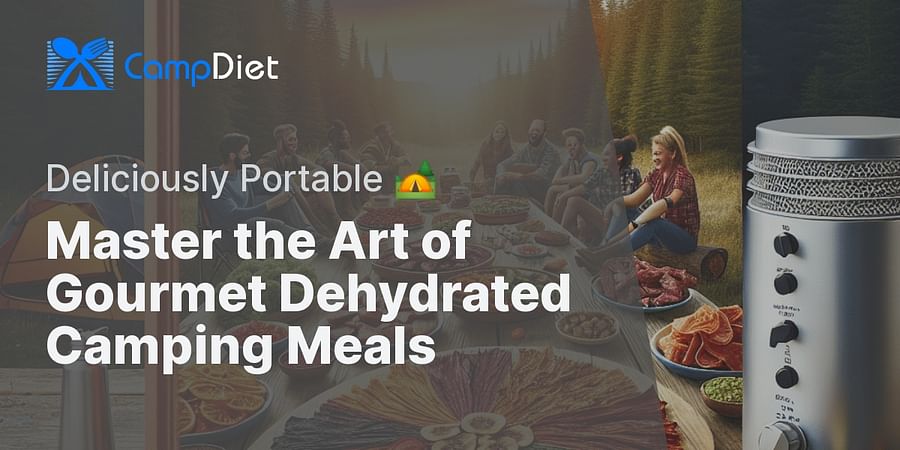Dehydrated Delights: Advanced Techniques for Creating Gourmet Dehydrated Camping Meals

When the wilderness calls, the savvy camper answers with a backpack full of dehydrated delights. Gone are the days of settling for bland, uninspiring meals while exploring the great outdoors. With advanced techniques in food dehydration, you can elevate your camping cuisine to gourmet heights. Not only do these meals lighten your load, but they also ensure that you have access to nutritious and delicious options that fuel your adventures.
Dehydration is an ancient technique that has been modernized for today's outdoor enthusiast. It involves removing moisture from food, which inhibits the growth of bacteria and extends shelf life significantly. However, this process isn't just about preservation; it's about concentrating flavors and maintaining nutritional content. By mastering dehydration, you can create dishes that are as rich in taste as they are in energy-providing nutrients.
To start dehydrating your own gourmet camping meals, you'll need the right equipment. A high-quality food dehydrator is a game-changer, providing consistent heat and air flow for optimal drying. When selecting a dehydrator, consider factors such as size, portability, and efficiency. For more detailed information on choosing the best model for your needs, explore our comprehensive guide on the best food dehydrators for camping.
While jerky is a well-known trail staple, there's a world of possibilities beyond dried meats. Think vibrant fruits and vegetables turned into chips or powders for flavor boosts. Imagine taking your favorite hearty soups and stews and transforming them into lightweight packets ready to be rehydrated with hot water from your campfire kettle. Don't forget about desserts—dehydrated fruits dipped in dark chocolate can be a sublime treat under the stars.
As you delve into creating these gourmet bites, consider incorporating superfoods like kale or blueberries to add a punch of antioxidants to your trail menu. And if you're following specific dietary preferences such as veganism or gluten-free living, dehydration provides an excellent way to ensure that you have access to suitable sustenance throughout your journey.
But why stop at traditional recipes? Adventurous campers can experiment with global cuisines by dehydrating exotic spices and ingredients to craft international dishes in remote settings. Imagine enjoying a Thai curry or an Italian risotto beside your tent—proof that with a little ingenuity, any dish can become camp-friendly.
A successful camping trip hinges on having ample energy to tackle those steep climbs or long hikes. That's why it's crucial to focus on nutrient-dense foods when planning your dehydrated meals. Proteins keep muscles strong; carbohydrates provide quick energy; fats offer sustained fuel; vitamins and minerals support overall health.
For more tips on creating balanced meal plans while enjoying nature's bounty, check out our guide on the best portable meals for campers. And remember that staying hydrated is just as important as eating well—pair these meals with plenty of water or make use of natural water sources if safe and available.
As we continue exploring advanced techniques for creating gourmet dehydrated camping meals, it becomes clear that with a little preparation and creativity, dining outdoors can be an extraordinary experience—one where every meal is both a necessity and a highlight of the day.
Imagine savoring a gourmet pasta dish with a rich tomato basil sauce, all while sitting by the campfire. Sounds impossible? Not with dehydrated sauces and seasonings. These concentrated flavor bombs can transform a mundane meal into a culinary delight. To create your own, begin by pureeing fresh herbs, spices, and vegetables. Spread the mixture thinly on dehydrator trays and process until crumbly. Once in camp, simply rehydrate with water and voila—a sauce that would make even a seasoned chef proud.
Don't forget to explore how to prepare lightweight, long-lasting foods for more tips on dehydrating your own meals.
Achieving nutritional balance is crucial when planning your camping menu. Dehydrated meats provide essential protein while dried fruits and vegetables offer vitamins, minerals, and fiber. To ensure you're getting a balanced diet on the trail, consider combining various dehydrated ingredients based on their macronutrient content. For example, mix dried beef strips with rehydrated quinoa and sundried tomatoes for an energizing meal that covers all your dietary bases.
For more insights into keeping your meals fresh in the wilderness, check out essential camping food preservation techniques.
Now that we've covered techniques and nutrition let's dive into some mouth-watering recipes. From hearty stews to exotic curries, there's no limit to what you can create with dehydrated ingredients. These recipes are designed to be lightweight yet flavorful, perfect for satisfying your gourmet cravings after a day of hiking.
If you're curious about the best equipment to use for dehydrating food, take a look at the best food dehydrators for camping.
For those who prefer plant-based options, be sure to visit Mastering the Vegan Trail Kitchen for vegan-friendly dehydrating tips.
The journey towards becoming an adept creator of gourmet dehydrated meals is both exciting and rewarding. By now, you should have a solid grasp of advanced techniques to elevate your camp cuisine from basic survival food to delightful dining experiences under the stars.
To continue enhancing your culinary skills in the wild, I highly recommend exploring backpacking recipes that will make you feel like a pro. And remember, always practice safe food handling by learning about the safety of eating dehydrated food daily while camping.
Camp cooking doesn't have to be limited by traditional methods or ingredients—embrace innovation through dehydration! With these advanced techniques at your fingertips, you're well-equipped to craft exceptional meals that will fuel your adventures and satisfy even the most discerning palates.
"The wilderness holds answers to questions we have not yet learned to ask." – Nancy Newhall
Fuel your next adventure with lightweight options; discover them at lightweight camping food choices. Bon appétit!
Post a comment